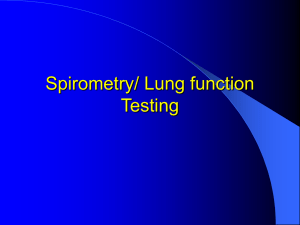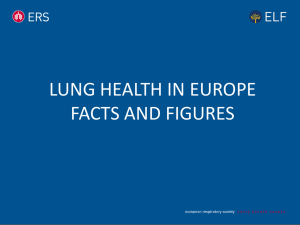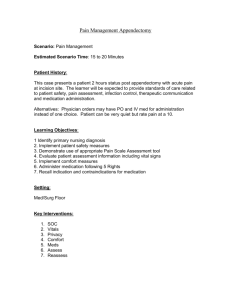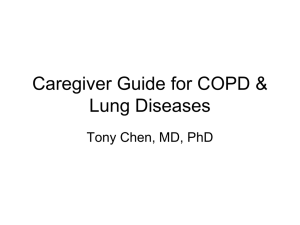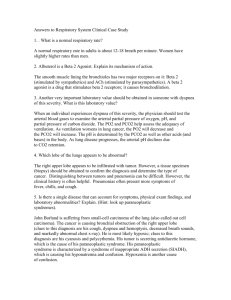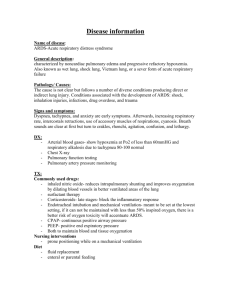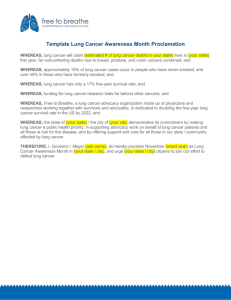Greater Manchester & Cheshire
advertisement
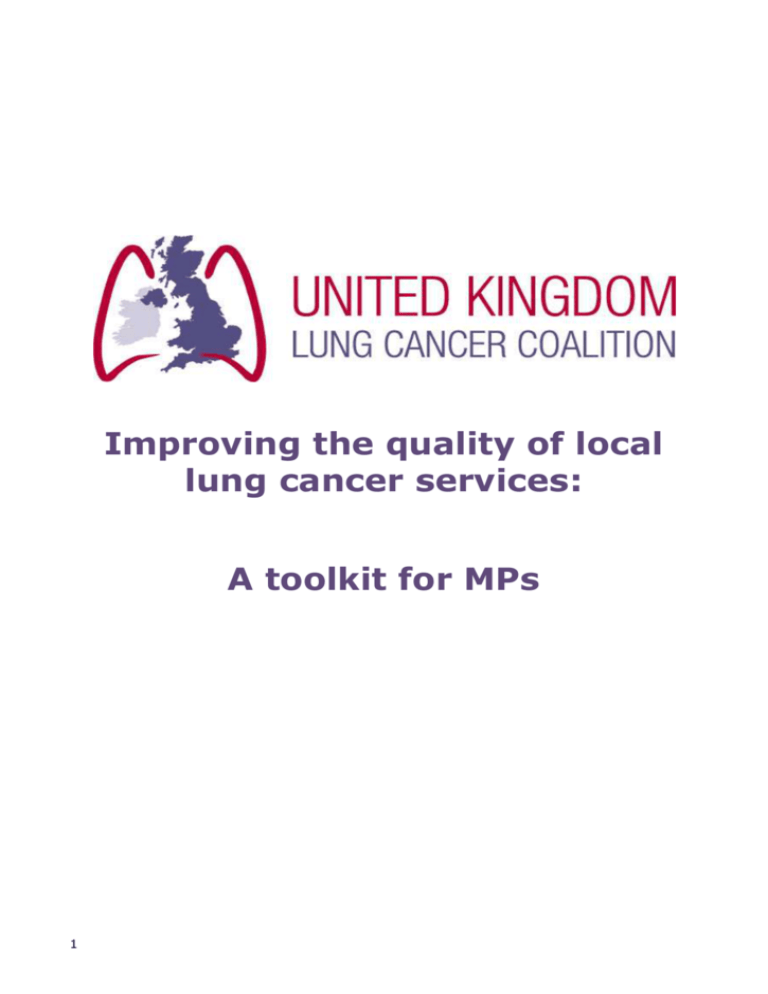
Improving the quality of local lung cancer services: A toolkit for MPs 1 Contents Table 1: Markers of high quality lung cancer service in primary care in your cancer network 3 Multidisciplinary team performance 3 Table 2: Markers of MDT performance in your cancer network 4 Table 3: Percentage of patients that were given the name of a CNS in charge of their care in your cancer network 5 Table 4: Markers setting out whether patients understood their condition and its management in your cancer network 5 Useful Resources 6 Appendix 1: Summary of recommendations from the Dream MDT report 7 Appendix 2: Template letter for CCGs 10 Appendix 3: Template letter for local providers 11 Appendix 4: Template letter for strategic clinical networks 12 Appendix 5: Template letter for health and wellbeing boards 13 Appendix 6: Template press release 14 Membership of the UKLCC 15 References 16 2 Quality in lung cancer services in your area We have developed this briefing to highlight the burden of lung cancer in your area and to provide a snapshot of the quality of lung cancer services available to your constituents, based on the latest hospital-level performance data from the National Cancer Patient Experience Survey (NCPES) for 2011/12 and National Lung Cancer Audit 2012. In some instances, there is no patient experience data available for lung cancer at hospitals in your area due to the small number of patients who participated in the survey, or if the trust did not submit data to the NCLA. This document includes information broken down by cancer network on the priority areas we have identified as key to supporting better outcomes for lung cancer patients: Incidence and outcomes Early diagnosis Effectiveness of specialist lung cancer teams Information and support for patients Incidence, mortality and survival Incidence Lung cancer is the second most common cancer in the UK, accounting for around 13% of all new cases – in 2009, 41,428 new cases were diagnosed1 Lung cancer incidence rates by region, 2008 - 102 Age-standardised incidence rate per 100,000 population 80 70 60 50 40 30 20 10 0 South East South West East of West London East Yorkshire England Midlands Midlands and The Humber Region 3 North West North East Mortality Lung cancer has a huge impact on national mortality with 34,859 lung cancer deaths reported in 20101 Lung cancer mortality rates per region, 2009 - 112 Age-standardised morality rate per 100,000 population 60 50 40 30 20 10 0 South West South East East of England London East Midlands West Midlands Yorkshire North West North East and The Humber Region Survival The UK has the worst one and five year survival rate for lung cancer compared to other equivalent countries3 The need to tackle lung cancer is underlined by the inclusion of improvement areas on both one and five year survival for lung cancer in the NHS Outcomes Framework 4 Between 2004-08, the average one year lung cancer survival rate in England was 29.4%. Survival rates at cancer network level ranged from 25.6% (Kent and Medway) to 34.5% (South West London)5 Between 2000-04, the average five year lung cancer survival rate in England was 7.9%. Survival rates at cancer network level ranged from 6.1% (Kent & Medway and Essex) to 11.3% (Merseyside and Cheshire)5 Early diagnosis Early diagnosis will be vital to the NHS in delivering against the aim of saving 5,000 lives each year by 2014/15 as set out in Improving outcomes: a strategy for cancer6. The poorer survival seen with lung cancer in the UK compared with several European countries can be largely attributed to the high proportion of patients being diagnosed with late stage disease – when the cancer is already spread and curative treatment is not an option 3. Data from the National Cancer Intelligence Network (NCIN) on routes to diagnosis show that, in 2010, almost 39% of lung cancer patients were diagnosed following an emergency admission to hospital. We know that survival rates for those patients who are diagnosed in an emergency setting are significantly lower than for those with other cancers 7. If more lung cancers are diagnosed at an earlier stage and we match our counterparts in other comparable countries, it is estimated that 1,300 deaths could be avoided each year. 4 In response to England's low early diagnosis rate, the Department of Health launched the latest phase of its ‘Be Clear on Cancer’ campaign aimed at improving public awareness of the signs and symptoms of lung cancer, and specifically encouraging those among high-risk groups to see their GP promptly if symptoms, such as a persistent cough, continue. The campaign will see adverts on television, print and radio from throughout July and August 2013, as well as public events taking place in a number of shopping centres across the country8. The National Cancer Patient Experience Survey (NCPES) for 2011/12 revealed that two thirds of lung cancer patients saw their GP about their symptoms no more than twice before being referred for diagnostic tests. This compares with 92% and 89% of breast and skin cancer patients respectively9. Table 1: Markers of lung cancer services in primary care in Greater Manchester and Cheshire Cancer Network9 Provider % of patients who saw a GP no more than twice before referral to hospital % of patients saying they were seen as soon as they thought necessary by a hospital doctor % patients reporting their health got better/ stayed the same while waiting for their first hospital appointment MID CHESHIRE HOSPITALS NHS FOUNDATION TRUST THE CHRISTIE NHS FOUNDATION TRUST EAST CHESHIRE NHS TRUST UNIVERSITY HOSPITAL OF SOUTH MANCHESTER NHS FOUNDATION TRUST SALFORD ROYAL NHS FOUNDATION TRUST N/A N/A N/A 64.5% 74.3% 48.6% N/A N/A N/A 65.9% 84.8% 79.8% N/A N/A N/A TRAFFORD HEALTHCARE NHS TRUST BOLTON NHS FOUNDATION TRUST TAMESIDE HOSPITAL NHS FOUNDATION TRUST WRIGHTINGTON, N/A N/A N/A N/A N/A N/A N/A N/A N/A N/A N/A N/A 5 WIGAN AND LEIGH NHS FOUNDATION TRUST CENTRAL MANCHESTER UNIVERSITY HOSPITALS NHS FOUNDATION TRUST THE PENNINE ACUTE HOSPITALS NHS TRUST STOCKPORT NHS FOUNDATION TRUST N/A N/A N/A 69.2% 83.3% 56.7% N/A N/A N/A Multidisciplinary team performance Clinical guidelines for lung cancer make clear that people with a working diagnosis of lung cancer should have their treatment and care discussed at a lung cancer multidisciplinary team (MDT) meeting10. Patients who are cared for by an MDT are more likely to receive an accurate diagnosis and staging, a choice of treatments, effective coordination and continuity of care, and support for their psychological and social needs11. The National Lung Cancer Audit Report 201212 revealed that 96.2% of lung cancer cases were discussed by an MDT, compared with 95% in 2009, and only 86% at the audit's inception. Despite this progress, there remains marked variation across individual trusts and networks 9. On a more practical level, the NCPES includes a specific question asking patients whether they felt that the healthcare professionals caring for them worked well together, which we have used as a proxy measure to indicate effective MDT working. 64% of lung cancer patients reported that the different people treating and caring for them worked well together. In addition, there was stark variation between individual hospital trusts in the proportion of lung cancer patients reporting that the hospital and community staff involved in delivering their care worked together seamlessly – ranging from 85% to 43%9. Table 2: Markers of MDT performance in Greater Manchester and Cheshire Cancer Network9 Provider % of patients have their care discussed by an MDT MID CHESHIRE HOSPITALS NHS FOUNDATION TRUST THE CHRISTIE NHS FOUNDATION TRUST EAST CHESHIRE NHS TRUST UNIVERSITY HOSPITAL OF SOUTH MANCHESTER NHS FOUNDATION TRUST 86.5% % of patients stated reporting that hospital and community staff always worked well together N/A 93.3% 42.9% 98.3% N/A 86.8% 61.4% 6 SALFORD ROYAL NHS FOUNDATION TRUST 99.6% N/A TRAFFORD HEALTHCARE NHS TRUST BOLTON NHS FOUNDATION TRUST TAMESIDE HOSPITAL NHS FOUNDATION TRUST WRIGHTINGTON, WIGAN AND LEIGH NHS FOUNDATION TRUST CENTRAL MANCHESTER UNIVERSITY HOSPITALS NHS FOUNDATION TRUST THE PENNINE ACUTE HOSPITALS NHS TRUST STOCKPORT NHS FOUNDATION TRUST 96.9% N/A 88.5% N/A 88.0% N/A 92.6% N/A 94.8% N/A 93.5% 75.0% 89.1% N/A Encouraging MDTs to improve performance: the Dream MDT for lung cancer In recognition of the important impact lung cancer MDTs have on the quality of care received by patients, the UKLCC developed The Dream MDT for lung cancer: Delivering high quality lung cancer care and outcomes14. Written by multidisciplinary lung cancer experts, the Dream MDT report makes a series of recommendations for how MDTs can benchmark their performance and identify areas in which they could improve. The experts based their recommendations on the kind of care they would want a member of their family or friend to receive if they were diagnosed with lung cancer. Even in the best performing areas there are likely to be steps that MDTs can take to improve treatment, care and support for patients and their families. The UKLCC has sent a copy to every Acute Hospital Trust, and we would urge commissioners and providers to refer to this when determining how they can improve lung cancer outcomes. The report’s recommendations can be found in Appendix 1. Information and support for patients Published in March 2012, the lung cancer quality standard defines what high quality care looks like. It makes clear that people with known or suspected lung cancer should have access to a named lung cancer clinical nurse specialist (CNS) who they can contact between scheduled hospital visits10. CNSs act as a key worker across the whole care pathway. This role enables them to assess patients’ holistic needs, identify emerging issues that might require medical attention and meet the complex information and support needs of patients and their families. The NCPES found that 90% of lung cancer patients were given the name of a CNS 9. Patients value the support of CNSs and the NCPES showed that patient experience is better among those people who have access to a CNS6. 7 Table 3: Percentage of patients that were given the name of a CNS in charge of their care in Greater Manchester and Cheshire Cancer Network9 Provider MID CHESHIRE HOSPITALS NHS FOUNDATION TRUST THE CHRISTIE NHS FOUNDATION TRUST EAST CHESHIRE NHS TRUST UNIVERSITY HOSPITAL OF SOUTH MANCHESTER NHS FOUNDATION TRUST SALFORD ROYAL NHS FOUNDATION TRUST TRAFFORD HEALTHCARE NHS TRUST BOLTON NHS FOUNDATION TRUST TAMESIDE HOSPITAL NHS FOUNDATION TRUST WRIGHTINGTON, WIGAN AND LEIGH NHS FOUNDATION TRUST CENTRAL MANCHESTER UNIVERSITY HOSPITALS NHS FOUNDATION TRUST THE PENNINE ACUTE HOSPITALS NHS TRUST STOCKPORT NHS FOUNDATION TRUST % of patients who were given the name of a CNS in charge of their care N/A % of patients who were definitely given enough emotional support by staff N/A 90.9% 65.4% N/A N/A 87.0% 82.1% N/A N/A N/A N/A N/A N/A N/A N/A N/A N/A N/A N/A 93.3% 85.7% N/A N/A It is imperative that simply being allocated a CNS is not seen as an end in itself. Lung cancer patients should have meaningful and regular access to a CNS to help meet their individual care needs. It is concerning that around a quarter of lung cancer patients reported that they did not find it easy to contact their CNS; this is slightly above the national average for all cancer patients9. In addition, data from the latest census of specialist nurses suggest that the ratio of new cases of cancer to one whole time equivalent (WTE) CNS is lower for lung cancer than many other cancer types14. Providing patients clear and tailored information about their condition and treatment options is key to improving their experience of care. The latest NCPES showed that 9: 8 Only 25% of lung cancer patients confirmed that they were offered a written assessment and care plan 83% of lung cancer patients were given a choice of different types of treatment – however, there is significant variation between hospitals, with scores ranging from 100% to just 25% 77% of lung cancer patients stated that they were given information about side effects – a marginal increase from 75% in 2010 Table 4: Markers setting out whether patients understood their condition and its management in Greater Manchester and Cheshire Cancer Network9 Provider MID CHESHIRE HOSPITALS NHS FOUNDATION TRUST THE CHRISTIE NHS FOUNDATION TRUST EAST CHESHIRE NHS TRUST UNIVERSITY HOSPITAL OF SOUTH MANCHESTER NHS FOUNDATION TRUST SALFORD ROYAL NHS FOUNDATION TRUST TRAFFORD HEALTHCARE NHS TRUST BOLTON NHS FOUNDATION TRUST TAMESIDE HOSPITAL NHS FOUNDATION TRUST WRIGHTINGTON, WIGAN AND LEIGH NHS FOUNDATION TRUST CENTRAL MANCHESTER UNIVERSITY HOSPITALS NHS FOUNDATION TRUST THE PENNINE ACUTE HOSPITALS NHS TRUST STOCKPORT NHS FOUNDATION 9 Percentage of patients who were offered a written assessment and care plan N/A Percentage of patients who were given a choice of different types of treatment N/A Percentage of patients given information about side effects 20.6% 85.7% 77.1% N/A N/A N/A 25.5% 86.9% 81.5% N/A N/A N/A N/A N/A N/A N/A N/A N/A N/A N/A N/A N/A N/A N/A N/A N/A N/A 41.7% 100% 89.3% N/A N/A N/A N/A TRUST References Cancer Research UK, Lung cancer incidence statistics, April 2012. Available at: http://www.cancerresearchuk.org/cancer-info/cancerstats/types/lung/incidence/uk-lung-cancer-incidencestatistics (accessed on 10 July 2013) 2 Public Health England, Local Tobacco Control Profiles for England, July 2013. Available at: http://www.tobaccoprofiles.info/tobacco-control#gid/1000110/par/E12000001/ati/102/page/0/ (accessed on 10 July 2013) 3 Cancer survival in Australia, Canada, Denmark, Norway, Sweden, and the UK 1995-2007 (the International Cancer Benchmarking Partnership): an analysis of population-based cancer registry data, The Lancet, Vol. 377, 8 January 2011, pg 127-138 4 Department of Health, NHS Outcomes Framework 2013/14, November 2012 5 National Cancer Intelligence Network (NCIN), UK Cancer Information Service (UKCIS), Cancer e-Atlas data by cancer network, May 2011 6 Department of Health, Improving outcomes: a strategy for cancer, January 2011 7 National Cancer Intelligence Network (NCIN), Routes to Diagnosis - NCIN Data Briefing, November 2010 8 Public Health England, 'Don't ignore a persistent cough', warns lung cancer campaign, July 2013. Available at: https://www.gov.uk/government/news/dont-ignore-a-persistent-cough-warns-lung-cancercampaign (accessed on 10 July 2013) 9 Department of Health, National Cancer Patient Experience Survey 2011/12 - National Report, August 2012 10 National Institute for Health and Clinical Excellence (NICE), CG121 – Lung cancer: The diagnosis and treatment of lung cancer, April 2011 11 National Cancer Action Team, Characteristics of an effective MDT, February 2010 12 Health and Social Care Information Centre, National Lung Cancer Audit Report 2012, December 2012 14 United Kingdom Lung Cancer Coalition (UKLCC), The Dream MDT for lung cancer: Delivering high quality lung cancer care and outcomes, November 2012 14 National Cancer Action Team, Quality in Nursing: Clinical Nurse Specialists in Cancer Care; Provision, Proportion and Performance: A census of the cancer specialist nurse workforce in England 2011, July 2012 1 10 Useful Resources UKLCC, The Dream MDT for lung cancer, November 2012, available at: http://www.uklcc.org.uk/images/stories/pdf/Dream_MDT_for_Lung_Cancer.pdf UKLCC, Commissioning toolkit, December 2012, available at: http://www.uklcc.org.uk/images/stories/pdf/lccg.pdf Cancer Research UK, Lung cancer key facts, available at: http://www.cancerresearchuk.org/cancer-info/cancerstats/types/lung/cancerstatskey-facts-on-lung-cancer-and-smoking Department of Health, Cancer patient experience survey 2011/12, August 2012, available at: https://www.gov.uk/government/uploads/system/uploads/attachment_data/file/1 26880/Cancer-Patient-Experience-Survey-National-Report-2011-12.pdf.pdf Department of Health, Improving outcomes: a strategy for cancer, January 2011, available at: http://www.cancerscreening.nhs.uk/breastscreen/improving-outcomes-strategyfor-cancer.pdf Department of Health, NHS Outcomes Framework 2013/14, November 2012, available at: https://www.gov.uk/government/uploads/system/uploads/attachment_data/file/1 27106/121109-NHS-Outcomes-Framework-2013-14.pdf.pdf National Cancer Intelligence Network (NCIN), Cancer e-Atlas, available at: http://www.ncin.org.uk/cancer_information_tools/eatlas/network/atlas.html?select =Eav&indicator=i0 National Cancer Intelligence Network (NCIN), Routes to diagnosis, November 2012, available at: http://www.ncin.org.uk/publications/data_briefings/routes_to_diagnosis NHS Information Centre, National lung cancer audit report 2011, 2011, available at: http://www.hqip.org.uk/assets/NCAPOP-Library/Lung-Cancer-NHS-IC-AUDIT2011.pdf National Institute for Health and Clinical Excellence (NICE), Quality standard for lung cancer, March 2012, available at: http://www.nice.org.uk/media/4ED/81/LungCancerQualityStandard.pdf 11 Appendix 1: Summary of recommendations from the Dream MDT report The full report can be accessed here: http://www.uklcc.org.uk/images/stories/pdf/Dream_MDT_for_Lung_Cancer.pdf The Dream MDT report’s recommendations are as follows: Recommendation 1: The clinical MDT should be supported by an extended team that includes allied health professionals and social workers, to ensure patients’ and carers’ practical needs are addressed. This should be put in place from the time that detailed investigation is taking place by the specialist MDT in secondary care onwards through confirmation of diagnosis, to active treatment, chronic care and follow up support Recommendation 2: All lung cancer patients should be able to access lung CNS support and advocacy when they need it throughout their whole patient journey to support their holistic needs Recommendation 3: Lung CNSs should be involved with pre-diagnosis care of suspected lung cancer patients, from the point of detailed investigations in secondary care Recommendation 4: Lung CNSs need to work closely with MDT coordinators, trackers and audit staff to ensure they are not taking on unnecessary administrative roles Recommendation 5: Despite the financial pressures facing the NHS, the role of the lung CNS in ensuring optimal care for patients, must be protected Recommendation 6: Where the results of a chest x-ray are normal and clinical suspicion of a diagnosis of lung cancer remains, GPs should consider an urgent referral under the two week wait pathway or have locally agreed arrangements for access to CT scans Recommendation 7: Any chest x-ray or CT scan suggesting the possibility of a primary lung tumour, or a newly detected or growing nodule greater than 8mm in diameter should directly trigger an appointment in a rapid access lung cancer clinic Recommendation 8: Communication between primary and secondary care is essential at all steps of the patient pathway. A greater focus should be given to improving communication between secondary and primary/community care in order that GPs are kept informed as rapidly as possible as to where patients (and their families) are along the care pathway Recommendation 9: All suspected lung cancer cases should be dealt with by a respiratory physician with a specialist interest in lung cancer Recommendation 10: Patients with suspected lung cancer should be assessed at a dedicated rapid access clinic. Patients should have their CT scan before their respiratory consultation to provide sufficient time for the respiratory physician and radiologist to examine the scan results in a diagnostic MDT meeting prior to the first face to face meeting in clinic Recommendation 11: The diagnostic pathway should be refined to encourage use of fewer, but higher value tests, likely to provide the diagnosis and stage of the disease in one step Recommendation 12: Each patient should be assigned a dedicated chest physician with a specialist commitment to lung cancer to manage their care through the whole pathway Recommendation 13: Specialist regional lung cancer MDTs should be established to deal with specified complex management problems and to ensure access to the latest advances in treatment which may not be available in all centres 12 Recommendation 14: The MDT should be properly supported by an administrative and audit team with proper IT facilities Recommendation 15: Care planning should be a two-stage process – with diagnostic planning taking place ahead of the rapid access clinic and separately from the treatment planning MDT meeting Recommendation 16: Each MDT should be able to draw on a team of specialist thoracic radiologists, and ideally two should be present at each meeting Recommendation 17: All imaging should be reported by a specialist radiologist and there should be local agreement on the wording of reports and recommendations to clinicians Recommendation 18: Adequate preparation time should be set aside before and after the MDT meeting and radiologists should be given adequate notice of cases Recommendation 19: Lung MDT pathologists should have specialist thoracic expertise and access to super-specialist opinion as and when necessary Recommendation 20: All MDTs should have a thoracic surgeon (undertaking a minimum one full day thoracic operating, minimum one full MDT per week and a thoracic surgical outpatient clinic with lung nurse specialist support) as a core member. He or she should be present at, or have adequate cover, for all meetings Recommendation 21: All patients with a disease identified as borderline for treatment (3A or 3B), or who are borderline fit for surgery, should have their case assessed by at least one specialist thoracic surgeon within a specialist MDT Recommendation 22: High quality video-conferencing should be available wherever required to improve working between specialist centres and DGHs Recommendation 23: Thoracic surgeons should not work as single surgeons in a cardiac unit Recommendation 24: Every lung cancer patient should have access to at least two dedicated thoracic oncologists offering cross-modality cover and expertise Recommendation 25: There should be an MDT discussion following completion of first-line surgical treatment, and patients should always be kept informed about the next step in their care pathway and their treatments options Recommendation 26: Every MDT should collect a minimum data set for every patient, contribute to the National Lung Cancer Audit and publish an annual report including resection rates, other treatments given and patient outcomes Recommendation 27: A clinical stock-take/end of treatment assessment should be held, when the CNS has sufficient time to go through what the patient knows, their prognosis, treatment options, point of contact and financial details Recommendation 28: SPARC or an equivalent tool should be used to assess patients’ needs. The results should form the basis for care plans and referral to other services for specialist support Recommendation 29: Every MDT discussion should include an assessment of which clinical trials individual patients may be eligible for 13 Recommendation 30: Data on which clinical trials are open for lung cancer patients and the record of trial entry by each centre should be made publicly available and easily accessible 14 Appendix 2: Template letter for CCGs [INSERT MP ADDRESS] [INSERT CCG ADDRESS] [INSERT DATE] Dear [INSERT NAME] Improving the quality of local lung cancer services In your role as chair of the [INSERT CCG] I am writing to you today as the Member of Parliament for [INSERT CONSTITUENCY], and on behalf of the UK Lung Cancer Coalition (UKLCC), to ask if you could update me on what plans you have in place to improve the quality of local care for lung cancer patients. As you may be aware, lung cancer is the most common cause of cancer death in the UK with 34,859 deaths attributed to the disease in 2010 alone1. As the UK’s largest partnership of leading lung cancer experts, NHS professionals, charities and healthcare companies the UKLCC has, since its inception in 2005, worked towards a clear ambition; to double one and five year lung cancer survival rates by 2015 and 2020 respectively. I am sure you would be as keen as I am to ensure that this is achieved for people living in [INSERT CONSTITUENCY]. However, more work on a local level needs to be undertaken. Outcomes for lung cancer patients living in the UK are still worse than in comparable countries 2, with only around a third of lung cancer patients surviving one year after they were diagnosed and less than ten per cent surviving after five years3. In recent years the UKLCC has sought to encourage a more progressive dialogue of how to improve lung cancer services, such as through the publication of its “The Dream MDT for lung cancer: Delivering high quality lung cancer care and outcomes” report. “The Dream MDT” developed 30 recommendations for how improvements in lung cancer care can be made, setting out aspirational standards of care for lung cancer multidisciplinary teams (MDTs). I would be keen to hear your thoughts on “The Dream MDT for lung cancer” document, which can be found at http://www.uklcc.org.uk/index.php/projects, and how you envisage working towards the implementation of the report’s recommendations. I would also welcome hearing more about how [INSERT CCG] will seek to improve local lung cancer services, with particular emphasis on early detection and diagnosis, and high quality, integrated care. Yours sincerely, [MP SIGNATURE] [MP NAME] Member of Parliament, [INSERT CONSTITUENCY] References Cancer Research UK, Lung cancer mortality statistics, available at: http://www.cancerresearchuk.org/cancerinfo/cancerstats/types/lung/mortality/ accessed 24 April 2013 2 Prof MP Coleman et al, “Cancer survival in Australia, Canada, Denmark, Norway, Sweden, and the UK, 1995—2007 (the International Cancer Benchmarking Partnership): an analysis of population-based cancer registry data” The Lancet, Volume 377, Issue 9760, pages 127 to 138 3 Cancer Research UK, Lung cancer survival statistics, available at: http://www.cancerresearchuk.org/cancerinfo/cancerstats/types/lung/survival/ accessed 24 April 2013 15 Appendix 3: Template letter for local providers [INSERT MP ADDRESS] [INSERT NHS TRUST ADDRESS] [INSERT DATE] Dear [INSERT NAME] Improving the quality of local lung cancer services In your role as the chief executive of [INSERT NHS TRUST] I am writing to you today as the Member of Parliament for [INSERT CONSTITUENCY], and on behalf of the UK Lung Cancer Coalition (UKLCC), to ask what plans you may have in place to improve the quality of care for lung cancer patients. As you may be aware lung cancer is the most common cause of cancer death in the UK with 34,859 deaths attributed to the disease in 2010 alone1. As the UK’s largest partnership of leading lung cancer experts, NHS professionals, charities and healthcare companies the UKLCC has, since its inception in 2005, worked towards a clear ambition; to double one and five year lung cancer survival rates by 2015 and 2020 respectively. I am sure you would be as keen as I am to ensure that this is achieved for people living in [INSERT CONSTITUENCY]. However, more work on a local level needs to be undertaken. Outcomes for lung cancer patients living in the UK are still worse than in comparable countries 2, with only around a third of lung cancer patients surviving one year after they were diagnosed and less than ten per cent surviving after five years3. The UKLCC is seeking to encourage a more progressive dialogue of how to improve lung cancer services, including publishing the “The Dream MDT for lung cancer: Delivering high quality lung cancer care and outcomes” report. “The Dream MDT” developed 30 recommendations for how improvements in lung cancer care can be made, setting out aspirational standards of care for lung cancer multidisciplinary teams (MDTs). I would be keen to hear your thoughts on “The Dream MDT for lung cancer” document, which can be found at http://www.uklcc.org.uk/index.php/projects, and how you envisage working towards the implementation of the report’s recommendations. I would also welcome hearing more about how your trust will seek to improve local lung cancer services, with particular emphasis on delivering high quality, integrated care from diagnosis through the cancer journey. Yours sincerely, [MP SIGNATURE] [MP NAME] Member of Parliament, [INSERT CONSTITUENCY] References Cancer Research UK, Lung cancer mortality statistics, available at: http://www.cancerresearchuk.org/cancerinfo/cancerstats/types/lung/mortality/ accessed 24 April 2013 2 Prof MP Coleman et al, “Cancer survival in Australia, Canada, Denmark, Norway, Sweden, and the UK, 1995—2007 (the International Cancer Benchmarking Partnership): an analysis of population-based cancer registry data” The Lancet, Volume 377, Issue 9760, pages 127 to 138 3 Cancer Research UK, Lung cancer survival statistics, available at: http://www.cancerresearchuk.org/cancerinfo/cancerstats/types/lung/survival/ accessed 24 April 2013 16 Appendix 4: Template letter for strategic clinical networks [INSERT MP ADDRESS] [INSERT STRATEGIC CLINICAL NETWORK ADDRESS] [INSERT DATE] Dear [INSERT NAME] Improving the quality of local lung cancer services In your role as chair of the [INSERT SCN] I am writing to you today as the Member of Parliament for [INSERT CONSTITUENCY], and on behalf of the UK Lung Cancer Coalition (UKLCC), to ask what plans the network has in place to support local services to improve the quality of care for lung cancer patients in the area. As you may be aware lung cancer is the most common cause of cancer death in the UK with 34,859 deaths attributed to the disease in 2010 alone1. As the UK’s largest partnership of leading lung cancer experts, NHS professionals, charities and healthcare companies the UKLCC has, since its inception in 2005, worked towards a clear ambition; to double one and five year lung cancer survival rates by 2015 and 2020 respectively. I am sure you would be as keen as I am to ensure that this is achieved for people living in [INSERT CONSTITUENCY]. However, more work on a local level needs to be undertaken. Outcomes for lung cancer patients living in the UK are still worse than in comparable countries2, with only around a third of lung cancer patients surviving one year after they were diagnosed and less than ten per cent surviving after five years3. The UKLCC is seeking to encourage a more progressive dialogue of how to improve lung cancer services, including publishing the “The Dream MDT for lung cancer: Delivering high quality lung cancer care and outcomes” report. “The Dream MDT” developed 30 recommendations for how improvements in lung cancer care can be made, setting out aspirational standards of care for lung cancer multidisciplinary teams (MDTs). I would be keen to hear your thoughts on “The Dream MDT for lung cancer” document, which can be found at http://www.uklcc.org.uk/index.php/projects, and how the network may be able to support services to implement the report’s recommendations. I would also welcome information on the network’s plans for supporting local services to deliver high quality integrated care for lung cancer patients, from detection and diagnosis throughout the cancer journey. Yours sincerely, [MP SIGNATURE] [MP NAME] Member of Parliament, [INSERT CONSTITUENCY] 17 References Cancer Research UK, Lung cancer mortality statistics, available at: http://www.cancerresearchuk.org/cancerinfo/cancerstats/types/lung/mortality/ accessed 24 April 2013 2 Prof MP Coleman et al, “Cancer survival in Australia, Canada, Denmark, Norway, Sweden, and the UK, 1995—2007 (the International Cancer Benchmarking Partnership): an analysis of population-based cancer registry data” The Lancet, Volume 377, Issue 9760, pages 127 to 138 3 Cancer Research UK, Lung cancer survival statistics, available at: http://www.cancerresearchuk.org/cancerinfo/cancerstats/types/lung/survival/ accessed 24 April 2013 18 Appendix 5: Template letter for health and wellbeing boards [INSERT MP ADDRESS] [INSERT LHWB ADDRESS] [INSERT DATE] Dear [INSERT NAME] Improving the quality of local lung cancer services In your role as the chief executive of [INSERT LHWB] I am writing to you today as the Member of Parliament for [INSERT CONSTITUENCY], on behalf of the UK Lung Cancer Coalition (UKLCC), to ask what plans the network has in place to support local services to improve the quality of care for lung cancer patients in the area. As you may be aware lung cancer is the most common cause of cancer death in the UK with 34,859 deaths attributed to the disease in 2010 alone1. As the UK’s largest partnership of leading lung cancer experts, NHS professionals, charities and healthcare companies the UKLCC has, since its inception in 2005, worked towards a clear ambition; to double one and five year lung cancer survival rates by 2015 and 2020 respectively. I am sure you would be as keen as I am to see this be achieved for people living in [INSERT CONSTITUENCY]. However, more work on a local level needs to be undertaken. Outcomes for lung cancer patients living in the UK are still worse than in comparable countries 2, with only around a third of lung cancer patients surviving one year after they were diagnosed and less than ten per cent surviving after five years3. The UKLCC is seeking to encourage a more progressive dialogue of how to encourage greater awareness of the symptoms of lung cancer, earlier detection and diagnosis, and high quality integrated care for patients throughout their lung cancer journey. I see an essential role for the health and wellbeing board, given its new commissioning responsibilities, and would welcome any information you can provide on how you will be working to improve outcomes for lung cancer patients living in the area. Yours sincerely, [MP SIGNATURE] [MP NAME] Member of Parliament, [INSERT CONSTITUENCY] References Cancer Research UK, Lung cancer mortality statistics, available at: http://www.cancerresearchuk.org/cancerinfo/cancerstats/types/lung/mortality/ accessed 24 April 2013 2 Prof MP Coleman et al, “Cancer survival in Australia, Canada, Denmark, Norway, Sweden, and the UK, 1995—2007 (the International Cancer Benchmarking Partnership): an analysis of population-based cancer registry data” The Lancet, Volume 377, Issue 9760, pages 127 to 138 3 Cancer Research UK, Lung cancer survival statistics, available at: http://www.cancerresearchuk.org/cancerinfo/cancerstats/types/lung/survival/ accessed 24 April 2013 19 Appendix 6: Template press release [INSERT DATE] LUNG CANCER SERVICES ‘COULD DO BETTER’ SAYS [INSERT NAME] MP [INSERT NAME] MP today [INSERT DATE] joined forces with leading lung cancer experts to call for better care and outcomes for [INSERT CONSTITUENCY] lung cancer patients. The move follows a recent report by the United Kingdom Lung Cancer Coalition (UKLCC) which shows that as many as a third of UK lung cancer patients still do not have their case discussed by a lung cancer multidisciplinary team; that lung cancer nurses are overstretched; and many cancer specialists may not be fully up-to-date with the latest lung cancer management practices.2 “Lung cancer is the biggest cancer killer in the UK, yet many aspects of lung cancer care provision across the country are not up to standard – which could be hindering patient survival,” says [INSERT NAME] MP. Currently, only 29.8% per cent of lung cancer patients in Greater Manchester and Cheshire Cancer Network are still alive one year after diagnosis1 - and overall UK survival rates continue to lag significantly behind comparable European countries. 3 The UKLCC’S vision is to double lung cancer survival during the next eight to ten years, with the co-operation of health professionals, policy makers, local primary care organisations, the NHS, local MPs and Government. “I am delighted to back calls which can improve outcomes for lung cancer patients and their families in my constituency,’ [INSERT NAME] MP stated. -endsNote to editors: The UK Lung Cancer Coalition (UKLCC) is the UK’s largest multi-interest group in lung cancer. It is a powerful partnership of the leading lung cancer charities, clinicians, healthcare professionals and healthcare companies which are committed to, and have a shared interest in, improving lung cancer survival and the quality of life of lung cancer patients. www.uklcc.org.uk Lung cancer kills almost 35,000 people each year4 - more than breast cancer, prostate cancer, bladder cancer and leukaemia combined5 – and accounts for more than a fifth of all cancer deaths.4 20 Currently, nearly three out of ten of men with lung cancer in England (29.4%) will live for a year and less than one in ten (7.8% in England) are still alive five years after diagnosis.6 For women, these figures are 33% and 9.3%.6 However, lung cancer can be cured if caught early enough. References: 1. National Cancer Intelligence Network (NCIN), UK Cancer Information Service (UKCIS), Cancer e-Atlas data by cancer network, May 2011 2. The Dream MDT for lung cancer: delivering lung cancer care and outcomes,’ UK Lung Cancer Coalition, Nov. 2012 Accessed at: www.uklcc.org.uk 3. ‘Cancer survival in Australia, Canada, Denmark, Norway, Sweden & the UK, 1995-2007’, The Lancet 377: 127-138, MP Coleman, D Forman, H Bryant, et al., 2011 4. Figures from Cancer Research UK, accessed at: http://info.cancerresearchuk.org/cancerstats/types/lung/mortality/ 5. Figures from Cancer Research UK, accessed at: http://info.cancerresearchuk.org/cancerstats/mortality/cancerdeaths/?a=5441 6. Figures from Cancer Research UK, accessed October 2012 and available at: http://www.cancerresearchuk.org/cancer-info/cancerstats/types/lung/survival/lung-cancersurvival For further information, please contact: [INSERT MP] press officer details Or Lynsey Conway UK Lung Cancer Coalition Tel: 07778 304233 21 Membership of the UKLCC Committee Members Richard Steyn, Consultant Thoracic Surgeon, Birmingham Heartlands Hospital; National Cancer Advisor; Chair of the UKLCC Dr Mick Peake, Consultant Respiratory Physician, Glenfield Hospital; National Clinical Lead for Lung Cancer David Bellamy, Trainer for Education for Health Alison Bennett, Macmillan Lung Cancer Nurse Specialist, Barnsley District General Hospital Paula Chadwick, Chief Executive, Roy Castle Lung Cancer Foundation Frank Chinegwundoh, Clinical Director for Surgery and Anaesthesia, Newham University Hospital NHS Trust; Consultant Urological Surgeon Emma Dewar, Director of Marketing and PR, The Roy Castle Lung Cancer Foundation Richard Harrison, Consultant Respiratory Physician, Department of Respiratory Medicine, University Hospital of North Tees Sharron Heginbottom, Patient Trustee, Roy Castle Lung Cancer Foundation Naomi Horne, Macmillan Lead Lung Cancer Nurse, Llandough Hospital Babu Naidu Professor Stephen Spiro, Professor of Respiratory Medicine at UCL (Retired) Dr Andrea Williams, Representative, Primary Care Respiratory Society UK Represented Patient Advocacy Groups 22 British Lung Foundation Cancer Black Care Cancer Research UK Macmillan Cancer Support Marie Curie Cancer Care The Roy Castle Lung Cancer Foundation
